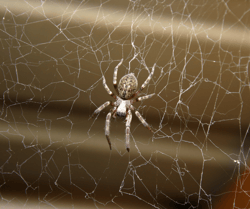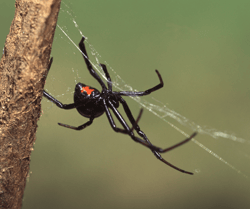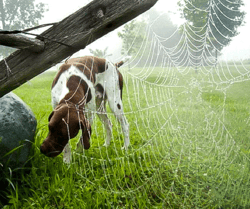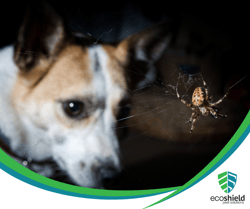As a pet parent, it's only natural to be concerned about the safety and well-being of your furry companion. From ensuring a balanced diet to providing a safe environment, you do everything in your power to protect your canine friend. But amidst the many potential dangers lurking in and around your home, one frequently asked question arises: can spiders harm my dog? Arachnids, with their unsettling appearance and formidable webs, have long been the stuff of nightmares for many humans. However, when it comes to our four-legged friends, the answer isn't as straightforward as one might think.
A Quick Refresher: What are Spiders?
Spiders are fascinating arachnids that inhabit virtually every corner of the globe, from dense rainforests to arid deserts and everything in between. They are a diverse and ancient group with a history dating back over 300 million years. As members of the class Arachnida, spiders are close relatives of scorpions, ticks, and mites. While they might evoke feelings of fear or unease in some people, understanding these creeping creatures can help separate reasonable concerns from unwarranted worries.
A defining characteristic of spiders is their eight legs, which distinguishes them from insects, which have six legs. These legs grant them impressive mobility and agility, enabling them to traverse various terrains and quickly react to changes in their environment. Spiders are also distinguished by their unique respiratory system, which typically involves book lungs or tracheae. Book lungs are specialized structures that resemble the pages of a book, allowing spiders to extract oxygen from the air. In contrast, tracheae are tube-like structures that deliver oxygen directly to body tissues.
One of the most remarkable features of spiders is their ability to produce silk, a versatile and strong material used for various purposes. Silk is generated in silk glands located in the spider's abdomen. As it passes through spinnerets at the rear end of the abdomen, it can be spun into different types of silk threads. Spiders utilize silk for a myriad of functions, such as building intricate webs to catch prey, creating egg sacs to protect and nurture their offspring, and even using silk as a lifeline for safety while exploring their surroundings. The silk's remarkable properties have inspired researchers to explore its potential for various human applications, ranging from medical sutures to lightweight, high-strength materials.
Spiders exhibit an incredible diversity in terms of size, coloration, and behavior, with thousands of known species and likely many more yet to be discovered. While most spiders are solitary creatures, some species engage in social behaviors, living in colonies and cooperating in various ways. Their diet primarily consists of insects and other small arthropods, which they capture using a combination of stealth, speed, and their venomous fangs. Despite their fearsome reputation, most spider species pose no threat to humans and play a crucial ecological role by helping to control insect populations. But the question remains: do spiders pose a threat to my canine companion?
 Spiders exhibit incredible diversity in terms of size, coloration, and behavior.
Spiders exhibit incredible diversity in terms of size, coloration, and behavior.
Can a Spider Bite My Dog?
Yes, some spiders can bite dogs if they feel threatened or provoked. However, it's important to note that most spiders are not aggressive towards larger animals like dogs and generally prefer to avoid them. Spiders typically only bite as a last resort when they feel their lives are in danger.
While most spider bites may cause minor irritation or swelling, some spiders possess venom that can be harmful to both humans and animals, including dogs. The severity of the bite and its effects depend on the species of spider and the individual dog's reaction to the venom. Common venomous spiders that might pose a risk to dogs in certain regions include the Black Widow and the Brown Recluse.
Symptoms of a spider bite in dogs can vary, but they may include redness, swelling, pain at the site of the bite, restlessness, lethargy, and even systemic effects in severe cases. If you suspect your dog has been bitten by a spider, it's essential to seek veterinary attention promptly.
 Common venomous spiders that might pose a risk to dogs in certain regions include the Black Widow (pictured above) and the Brown Recluse.
Common venomous spiders that might pose a risk to dogs in certain regions include the Black Widow (pictured above) and the Brown Recluse.
Are Spider Bites Deadly to Dogs?
While spider bites on dogs can cause discomfort, pain, and mild to moderate reactions, most spider bites are not deadly to dogs. The majority of spiders are not equipped to pierce the skin of larger animals like dogs, and even when they can bite, they rarely pose a significant threat. Most spiders prefer to avoid confrontation with larger creatures and will only bite if they feel threatened or cornered. That said, fatalities are possible, if rare when bitten by a particularly venomous spider such as the Black Widow or Brown Recluse. Smaller breeds and younger pups are considered to be especially at risk.
It's essential to remember that bites from these venomous spiders are still relatively uncommon. Many dogs experience mild reactions to spider bites that do not require medical treatment. However, if you suspect that a venomous spider has bitten your dog or notice any concerning symptoms, it's crucial to seek immediate veterinary care.
 Smaller breeds and younger pups are considered to be especially at risk.
Smaller breeds and younger pups are considered to be especially at risk.
How Can I Prevent my Dog from Being Bitten by a Spider?
Preventing your dog from being bitten by a spider involves taking some precautionary measures and being vigilant about their surroundings. While most spider bites on dogs are not life-threatening, it's still essential to minimize their exposure to potential hazards. Here are some tips to help prevent your dog from being bitten by a spider:
- Regular Cleaning: Keep your living spaces clean and clutter-free. Regularly vacuum and dust to minimize potential spider hiding spots. Pay close attention to corners, crevices, and areas where spiders might build webs.
- Outdoor Inspection: Inspect your yard and other outdoor spaces where your dog spends time. Look for spider webs, especially in hidden or less-frequented areas. Remove any webs you find to discourage spiders from nesting near your home.
- Avoid Unknown Insects: Teach your dog to avoid investigating or playing with strange-looking insects, including spiders. Discourage them from approaching and sniffing around areas where spiders might be present.
- Be Cautious on Walks: While on walks, avoid letting your dog explore tall grass, shrubs, and piles of leaves, as these areas can be potential hiding spots for spiders.
- Check Outdoor Toys: Before allowing your dog to play with outdoor toys, inspect them for any spider webs or insects that might have taken refuge inside.
- Professional Pest Control: If you notice a significant spider infestation around your home, consider consulting a professional pest control service to address the issue.
- Create a Safe Indoor Environment: If you live in an area where venomous spiders are prevalent, consider keeping your dog indoors during peak spider activity times, such as dusk and nighttime.
- Use Insect Repellents: There are pet-safe insect repellents available that can help deter spiders and other insects from approaching your dog. Consult with your veterinarian to find a suitable product for your pet.
- Learn about Venomous Spiders: Familiarize yourself with the appearance of venomous spiders common to your region. Knowing what they look like can help you take necessary precautions and seek immediate veterinary care if you suspect a bite.
- Regular Veterinary Checkups: Regular visits to the veterinarian can help ensure your dog's overall health and well-being. If you have any concerns about spider bites or other potential hazards, discuss them with your vet.
By being proactive and implementing these preventive measures, you can significantly reduce the likelihood of your dog being bitten by a spider and create a safer environment for your beloved pet.
 Remove any webs you find to discourage spiders from nesting near your home.
Remove any webs you find to discourage spiders from nesting near your home.
Can EcoShield Pest Solutions Help Protect my Dog from Spider Bites?
Yes! Professional pest services can help protect your dog from spider bites by reducing the spider population in and around your home. Here's how EcoShield services can be beneficial:
- Identification and Targeted Treatment: EcoShield technicians are trained to identify different spider species and their nesting areas. By understanding the behavior and habits of specific spiders, they can implement targeted treatment plans to reduce their presence on your property.
- Web Removal: De-webbing can physically remove spider webs and egg sacs from your home's exterior and interior. By eliminating existing webs, they disrupt the spiders' habitat and discourage them from rebuilding in the same areas.
- Exterior Barrier Treatments: EcoShield offers exterior barrier treatments that create a protective barrier around your home, deterring spiders from entering. These treatments can be especially helpful in reducing spider populations around entry points like doors and windows.
- Inspection and Prevention: EcoShield technicians thoroughly inspect your property to identify potential entry points for spiders and other pests. We will provide recommendations on sealing or minimizing these entryways, making it more challenging for spiders to enter your home.
- Pet-Friendly Solutions: EcoShield prioritizes the safety of your pets, including dogs. We offer products and treatment options that are formulated to be safe for pets while effectively targeting pests.
- Ongoing Maintenance: EcoShield offers ongoing maintenance plans to help keep your property pest-free throughout the year. Regular visits by our trained technicians can help ensure that spider populations remain under control.
While a professional pest control provider can significantly reduce the spider population and minimize the risk of spider bites, it's essential to remember that complete eradication of spiders is not realistic (or environmentally safe). Spiders play a crucial role in controlling insect populations, and not all spiders are harmful to humans or pets. Our goal is to manage spider populations in a way that promotes a safe and balanced environment for both you and your dog.
If you want to protect your pup in and out of the home this summer, give EcoShield a call today or fill out the form on this page to get started!
